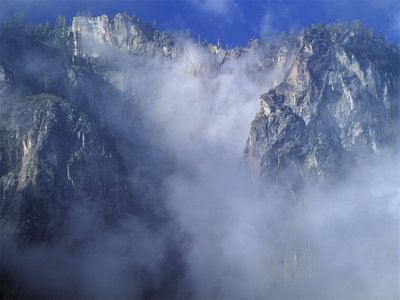
Mountains are a vertical altar and a wide barricade. They push and pull us; they dismantle confusion and reconstruct darkness as light. By thinning oxygen they go against life, and give it back in the form of elbow room. They represent danger; they give us beauty in jolts. We go up into them to experience hardship and find ourselves overcome with what the Chinese call "rustic joy." Mountains provide a different kind of breathing, as human entanglements come unraveled and vision clears.
Mountains are both forbidding and enticing: they invite us in and throw us out. Their vertical intricacy acts as a narcotic on us. Thought to be the center of the earth in indigenous cultures, mountain environments have been celebrated in poems and songs since humans began walking their trails, bathing in their rivers, finding food in their high meadows, and taking refuge in their caves.
. . . Mountains pull at us, soul, psyche, and body.
-Gretel Ehrlich, "What Is the Worth of the Wind River Mountains;" Shambhala Sun, March 2006
When I was an angry, lost, and confused teenager, a mountain saved my life. The tallest mountain close to my home in Southern Oregon, Greyback, was only 7,055 feet in elevation, but few people had climbed to the top of its weathered granite summit.
The first time I was on the mountain (it made up with girth what it lacked in height), I was only eleven years old. The wind was music through the trees, ravens circled overhead, and the strong musk of sage stained the warm summer air. I was home.
Years later, when I was lost in the darkest period of my life, I returned to that mountain several times when I felt myself at a point when the world didn't seem to want my presence. I was a mess, and for reasons that were not clear to me at the time, I was drawn to the mountain.
Most times I climbed, I dropped acid or ate mushrooms while I drove the winding road to the trailhead. By the time I was on the trail, the forest was alive with movement and shadows. My mind emptied of all my troubles--real or perceived.
It took more than two hours at a quick pace to reach the summit. I was drenched in sweat that I experienced as my body melting into the mountain. At the top, with the chill wind dispersing the molecules of my body and mind into the surrounding landscape, I lost myself for a couple of hours.
I fed chipmunks that had no fear of this sweaty, vibrating human animal. I laid on the raw granite boulders and absorbed sunlight, becoming a part of the mountain.
Its energy filled me up and cracked me open. I cried like a newborn, then laughed like a madman, just riding the waves of emotions that needed to be released. I felt primal and beyond time--I was the mountain.
I had witnessed the glaciers carving moraines and then recede. I had seen the first hunters come to the valley and venture up my slopes thousands of years before. I saw the white settlers replace the tribes by force. I saw my young self walk the lower trails years before, and I felt sadness for what his future held for him.
Then I was back in my life and sitting amid scrub pine and wild strawberries. And for the next few hours I felt healed. The mountain's medicine had--for a while, at least--salved my aching soul.
I feel the magic of that mountain in my life to this day. I have taken the only three women I have deeply loved to that place so that, by knowing the mountain, they may know me better.
I have worked to prevent its old growth from being logged and to prevent new roads from being carved into its flesh.
It's been three years since I have climbed its dusty, hot trails. I will return. It is--for me--a power place, a place where I can feel my energy amplified by the earth's energy, allowing me to get outside of myself.
No comments:
Post a Comment